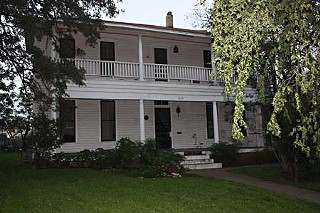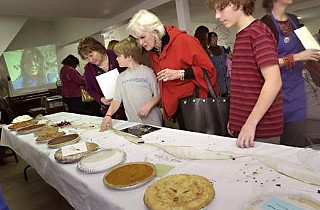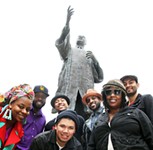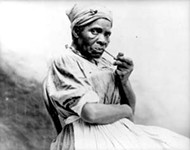Peace Through Pie
Bringing the community together around the table
By Toni Tipton-Martin, Fri., Jan. 15, 2010

Two words describe my reaction when artist and lecturer Luanne Stovall and I met for the first time over coffee last year to discuss her idea of a communitywide pie social to celebrate the Martin Luther King Jr. holiday: Shock and Awe.
Since 1995, Stovall had been serving pie to friends and family as a way of coming together to celebrate Dr. King's birthday, but last year she moved the homage into the public domain by inviting the members of Sweet Home Missionary Baptist Church to host an inaugural Dream Pie Social. The Clarksville church, which was founded by freed slaves, agreed, and on Jan. 17, 2009, homemade pies, a children's program, and a silent auction generated a lively gathering of 200 participants, good will, and conviviality and raised $1,000 for a much needed handicap access ramp for the church.
More than 20 years earlier, I also envisioned that food would be part of the MLK Day observance when I proposed that the Los Angeles Times Food section be the first to salute the slain civil rights leader with a menu of his favorite foods. The paper declined. I interviewed marchers and others who participated in his nonviolent crusade against segregation anyway, including Myrlie Evers-Williams, asking each of them to suggest a theme or suitable food type. Myriad ideas came to mind: International to salute his global vision? Soul food because he was a black man? Southern to acknowledge his home and the focus of his work? On Jan. 9, 1985, the Los Angeles Wave, a community paper, published my story, which encouraged readers to make a Southern-styled dinner menu part of their observances. Since then, even though Americans commemorate other holidays with food rituals, there is still no universal tradition that honors Dr. King's legacy.
But, a pie social?
The notion needed some research.
The tradition of neighbors coming together to share pie can be traced to lavish Roman banquets during which aristocrats gorged themselves for days on exotic delicacies, fine wines, and rich pastries – including "huge, two- and three-crust pies filled with filets of fish, chicken, songbirds, and meat, seasoned with eggs, herbs, wine sauce and spices," according to Marcus Gavius Apicius, a first century Roman nobleman and gastronome who is credited with writing history's first cookbook, De Re Coquinaria.
These ancient flat-dough creations inspired numerous pie concoctions and customs, including the pie social – a way for family and friends to gather and share pie. Industrious African-American educators, including Mary McLeod Bethune and Charlotte Hawkins Brown, adopted the pie social tradition in the early 20th century, selling sweet potato pies to raise money for the community and to fund education, independence, and freedom. And, evidently, Dr. King loved pie.
Without hesitation, I joined Stovall's grassroots movement, and we began rekindling the pie social as a way to embrace Dr. King's dream of equality. The vision of the ServeaDream Organizing Committee is that a new ritual will be associated with the King holiday and that the entire community will share in the world's pie.
The group is made up of an eclectic but passionate mix of community leaders and organizers, food professionals, and clergy. In addition to establishing a food tradition for the King holiday, the committee hopes to raise funds that will be used to support the homeless and build restoration funds for two important cultural landmarks, Sweet Home Missionary Baptist Church and the Limerick-Frazier House in East Austin.
Beginning this week, pie social events are planned throughout the city wherever there is an oven. These include:
• a piemaking field trip to the Kitchen Space for students in the Travis County Day Enrichment Program;
• a homemade pie auction and program at Sweet Home Missionary Baptist Church;
• a pie-sharing program sponsored by Texas Pie Kitchen, which feeds the homeless at Austin Resource Center for the Homeless; and
• a Pie4All Dream Pie Social featuring area restaurants at the Austin Area Heritage Council's Cultural Festival following the MLK March. For details and schedules, which are still emerging, visit www.serveadream.org.
Spontaneity is just part of the vision, says Stovall, who believes that anyone, anywhere, can share pie stories and be part of the celebration. "Every January, during the coldest, darkest time of the year, we can look forward to the aroma of delicious pies baking in the oven," she explains. "Any gathering can be a Dream Pie Social, and any pie can be a Dream Pie if it is served with that intention. Participants simply need to be willing to encourage friends near and far to join them in January and all year-round in events that can include community service projects involving pie, pie auction fundraisers, pie gatherings in restaurants, and pie-baking talent contests. The possibilities are limitless."
With these "three golden rules for a Dream Pie Social" in mind, the committee expanded the invitation to the entire Austin community to share pie donated by restaurants, bakeries, and private chefs as an opportunity for citywide fellowship and fundraising. The Pie4All Dream Pie Social celebrates Dr. King's legacy while uplifting diversity and multiculturalism in the city. The march begins at 9am at the MLK statue on the University of Texas campus, proceeds to the Capitol for a brief program, then concludes at the Cultural Festival on the historic campus of Huston-Tillotson University.
Funds raised at the festival benefit the SANDE Youth Project, a 501(c)(3) food and heritage program, which I founded with just $500 and the promise of lease space in a city of Austin historic landmark, that teaches basic cooking skills and nutrition to at-risk youngsters. The program will be located in the restored Limerick-Frazier House at 810 E. 13th, which is the last standing building associated with Samuel Huston College, now Huston-Tillotson University.
SANDE uses food to teach 10 core values to children in the areas of spirituality, attitude, nutrition, deeds, and emotions. The program is based on public health evidence thatengaging children in basic meal planning and preparation encourages them to try new andhealthyfoods, which may reduce development ofdiseases with diet as a risk factor, enrich academic achievement, and inspire personal and civic responsibility.
SANDE also seeks to preserve and celebrate the rich legacy of culture and hospitality at the Limerick-Frazier House, which is recognized for its 100-year-plus history as a "practice house" where domestic arts and science students pursued educations in home management, increased their literacy, and engaged their creative entrepreneurial skills through fundraising suppers.
A House, Then a Home

Professor John and Laura Frazier were not discouraged by the rudimentary facilities they encountered when they moved to Central Texas at the turn of the century. As children of former slaves, they expected them. So the young couple, who came Austin to begin careers dedicated to education at Sam Huston College, did what came naturally: They rolled up their sleeves. Bonded with the neighboring community. Pooled resources. And eventually dipped into their own personal wellspring for the greater good.
As part of a communitywide strategy to accommodate the growing student enrollment at the private black college and to expand the school's severely limited physical plant, the Fraziers dedicated part of their home – which was built in 1876 by stonemason and real estate investor Joseph Limerick and his wife, Elizabeth – to the school.
(Deed records indicate that the Limericks lived near this location but didn't occupy it. The property was purchased by Austin businessman A.J. Adkisson and his wife, Abigale, on April 10, 1880, then by the Herrick family, W.D., W.T., and Sue, in 1893. The home remained in the Frazier family, cared for by the math professor's wife and children, Mason, Laurene, and John S., into the 1970s.)
According to the Weekly Bulletin annual catalog edition of Samuel Huston College, 1914-1915, the Eliza Dee Industrial Home opened with accommodations for 14 girls, but as many as 20 to 25 crowded in during the first year. The aim of the home was "to develop Christian character and to teach economy, energy and neatness in domestic science." The Home Economics Department students didn't conduct pie socials at the Eliza Dee Industrial Home for girls, but they did help to raise funds for a new $20,000 domestic arts building by creating and selling tickets to an exclusive "Jitney" supper, described as a "glorified cafeteria with all the trimmings." The suppers earned "much praise," were heralded as "a success," and contributed to the construction fund for the new building that was eventually located on the corner of East Avenue and 12th Street.
By midcentury, the regal two-story had become a pillar in East Austin society – establishing a reputation as a cornerstone in the lodging industry and functioning as a boarding house and hotel for African-American tourists and traveling students during Jim Crow segregation.
SANDE was designed to continue this tradition of hospitality and service at Limerick-Frazier House by motivating young people toward productive futures in the culinary arts. And it is inspired by two Old World traditions: theconcept that children learn life skills athomeand an African custom whereparents take responsibility for transitioningchildren to adulthood. The program adopts a similar philosophy to develop self-esteem and knowledge in underprivileged children; implements an equallycreative and unique approach to communicate nutrition and fitness concepts that also enhance math, science, and writing skills; and provides opportunities for community service.
If you ask famous chefs what inspired them toward culinary careers, they will tell you that their love of food and passion for cooking developed at a young age, usually in Mother's kitchen. As a rite of passage project, SANDE students join a culinary family when they learn to cook with culinary role models at the Limerick-Frazier House. Partnerships are being discussed with Central Market, Les Dames d'Escoffier, Eastside Memorial Green Tech High School, the Institute of Hospitality & Culinary Arts at Travis High School/Austin Independent School District, and the University of Texas' Division of Diversity and Community Engagement to engage a diverse community of volunteers as mentors to teach technical competencies and lead practical activities that build life skills and increase self-esteem in disadvantaged children.
And the SANDE experience won't just be limited to healthy cooking classes. When the kids aren't stirring creative concoctions in its historic kitchen, the Limerick-Frazier House will serve the community as a museum and community center, with exhibits of historic artifacts, a library of rare cookbooks, artist-led workshops and demonstrations, and organic gardens. Within three years, the plan is for the kids to produce their own pastries to be sold in the Limerick-Frazier gift shop.
Students at SANDE will also learn cultural and family traditions, interview neighbors, and learn culinary history so they see all the ways people, experiences, and decisions shape the world. Through a cookbook writing and publishing project, SANDE students will find their own role to play in the community and develop a sense of dignity and independence as they create their own unique written legacy for the future.
And, of course, they'll serve up pie during the ServeaDream Dream Pie Social at Huston-Tillotson.
The hope is that through ServeaDream, SANDE will begin teaching important life lessons, such as strength, tolerance, and patience, in a casual, family setting and will eliminate the barriers that exist between young people interested in culinary careers and food industry professions, while the community at large uplifts diversity, encourages inclusiveness, and achieves "peace through pie."
Toni Tipton-Martin is an Austin-based food journalist and culinary historian. She was one of the founders and the first president of the Southern Foodways Alliance. She is also the founder of the SANDE Youth Project. Read her blog at www.thejemimacode.com.












